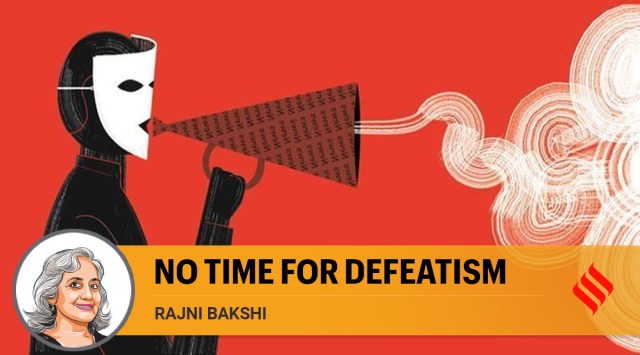
Pratap Bhanu Mehta’s article ‘With eyes wide open’ (IE, April 21) is empirically accurate and yet unjustifiably defeatist.
The fear of hurtling into an abyss has been around long before this current spate of violence. What is new is the widespread feeling of being overwhelmed by this threat, of not having any effective ways to contain or dissolve the toxicity.
I grew up in a family where, as children, we were taught to recite these lines as a counter to fear and the feeling of being overwhelmed by any situation. It was much later, as a middle-aged person, that I truly began to draw strength from these lines. But before I could do that, like most of my contemporaries, I passed through a brief spell of thinking that such prayers are the last resort of the helpless and the defeated.
With or without the aid of prayers, how we orient ourselves, or anchor ourselves, is surely as important as any objective measure of how far we now are from the abyss.
Empirically, it is valid to see those who are committed to “sadbhava” (good faith) and “sambhava” (fellow-feeling) as being out-flanked and out-manoeuvred. But are we really outnumbered?
Yes, there is evidence that being communal, as Mehta writes, “is fast becoming the default common sense of civil society”. But what of the dissent and disagreement within families and households?
Civil society, in a coherent organised form, may be thin on the ground when it comes to effectively countering the toxicity. But “civil society” was never the same as “samaj” — an organic, multi-layered, cultural and psychological reality that is both fluid and grounded.
It is in the innards of samaj that the legend of worshipful squirrels thrives over aeons and becomes a commonly experienced “bhava” — attitude and intention.
The worshipful squirrels appear in the Ramayana when the army of monkeys and other animals is helping Ram to build a bridge to reach Lanka. The squirrels approach Ram and say they too want to help in this noble endeavour of defeating arrogance and violent force, as embodied by Ravana. Ram is appreciative but wonders how the tiny, light-weight creatures could contribute to heavy stone lifting.
The answer is provided by the squirrels, who rush to the beach, get wet in the waves, then roll their furry little bodies in the sand before rushing to the under-construction bridge to shake off the sand and smoothen the pathway that Ram must tread.
All well and good, you might say, but it is not the squirrels that liberate Sita. That takes muscle power, weapons and all the resultant blood and gore.
Perhaps the most enduring insight of the Indic civilisation is knowing that the “bhava” of the squirrels and the gory reality of the battlefield are not a binary divide but an overlapping simultaneity. Thus, the striving for truth is a process of unveiling reality in its multiple dimensions, not a contest between opposites. Knowing this, not merely believing it, may not dissolve our anxieties about the approaching abyss but it can strengthen us.
On scale, we may still feel helpless about being unable to stop unspeakable brutalities being committed in the name of religion and politics. But we can be more profoundly re-energised by every account of individuals and small groups that do heroically protect innocent victims from the fury of mobs. And such stories surface with unfailing regularity.
We will still feel shock and grief when people we love and respect support or make excuses for the hatred and violence. But if we cease to see them as our binary opposite then all kinds of possibilities for empathy and dialogue open up.
Above all, we can build strength by acknowledging the limits of what we know.
It is a truism that all empirical knowledge is incomplete and thus potentially flawed. Unfortunately, the high-speed access to seemingly limitless information in the digital age fosters the delusion that we not only see but also understand all the moving pieces of the puzzle.
This is not a call for false optimism. That would be easy and futile. The difficult task before us is how to be watchful with an inward silence that empowers us to resist and deflect jump scares.
This column first appeared in the print edition on April 27, 2022 under the title ‘No time for defeatism’. Bakshi is an author and the founder of the online platform ‘Ahimsa Conversations’